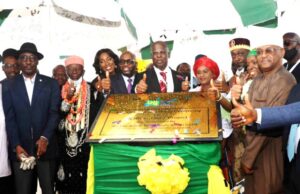The All Progressives Congress (APC) has said that the Nigerian Liquefied Natural Gas (NLNG) Train 7 Project will take Nigeria’s capacity to process its abundant gas deposit to about 30 million tonnes annually.

L-R Executive Secretary, NCDMB, Simbi Wabote; NNPC GMD, Mele Kyari; NLNG Board Chairman, H.M. Dr. Edmund Daukoru; Mrs. Oma Attah; NLNG MD, Tony Attah; Rivers State Deputy Governor, Dr. (Mrs.) Ipalibo Harry Banigo; the Amanyanabo of Grand Bonny Kingdom, H.M. King Edward Asimini William Dappa Pepple III, Perekule XI; NLNG GM, External Relations & Sustainable Development, Eyono Fatayi-Williams; and NLNG Deputy MD, Sadeeq Mai-Bornu, at the NLNG’s Train 7 groundbreaking Ceremony in Bonny last week .
Senator John Akpanudoedehe, National Secretary, APC Caretaker and Extra-ordinary Convention Planning Committee (CECPC), on Wednesday stated this in a statement in Abuja.
He congratulated President Muhammadu Buhari for inaugurating the construction of the 10 billion dollars NLNG Train 7 project.
The APC scribe noted that the Train 7 NLNG project was part of the Decade for Gas Development Initiative, which was an element of the National Gas Policy of 2017 articulated by the Buhari-led administration.
“Train 7 is designed to produce 8 million tonnes of Liquefied Natural Gas (LNG) and condensates annually.
“It also promises to lift Nigeria’s LNG production to 30 million tonnes per annum from the current 22 million tonnes,” he said.
This, he added, was in addition to diversifying the country’s economy in line with the promise made to Nigerians by the APC.
Read Also: Maritime Industry Stands Still As Hassan Bello Bows Out Of Shippers’ Council In Style
Akpanudoedehe said that the project added to the long list of major strategic projects being implemented by the APC-led administration of President Buhari.
He expressed optimism that the project would boost Nigeria’s foreign exchange earnings and create thousands of jobs during and after construction.
He explained that the project would also contribute to the country’s industrial development, as well as encourage the use of gas as fuel of choice for domestic purposes.
He congratulated Nigerians on the development, saying the country had embarked on other gas-utilisation projects.
This, he said, included the National Gas Expansion Programme, the construction of the 614-km Ajaokuta-Kaduna-Kano (AKK) gas pipeline and the Autogas policy.
“With these projects coming to fruition, Nigerians would tremendously benefit as more of the 600 trillion Nigeria’s gas endowment is processed and converted into a commodity,” Akpanudoedehe said.
















Discussion about this post